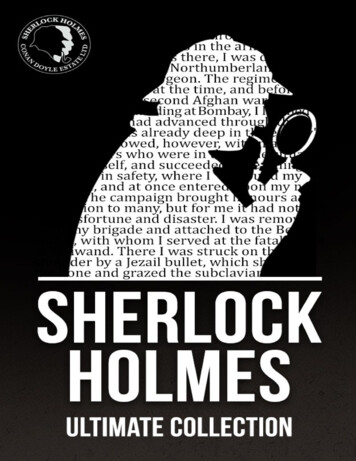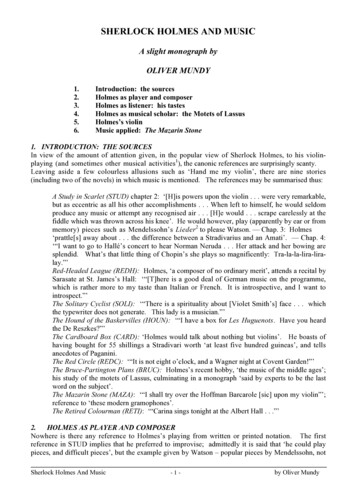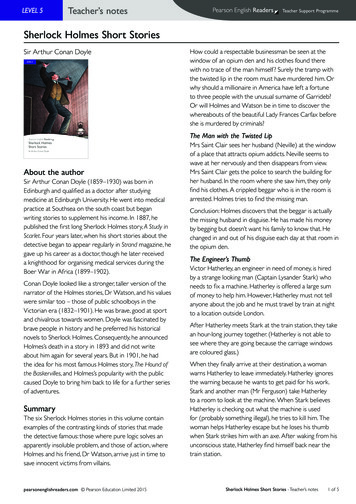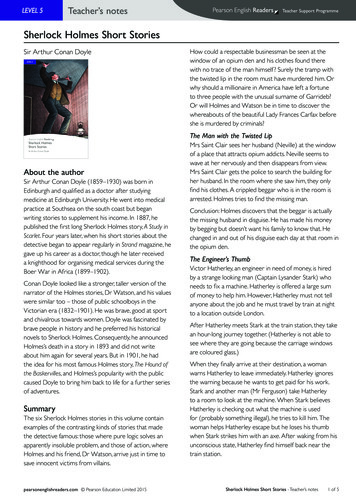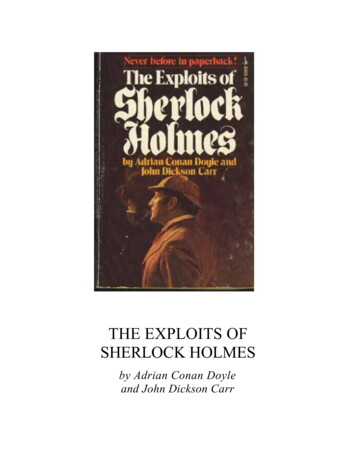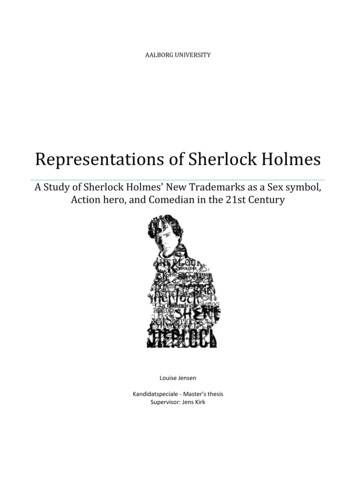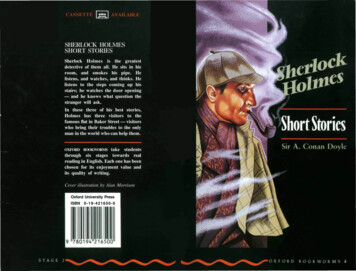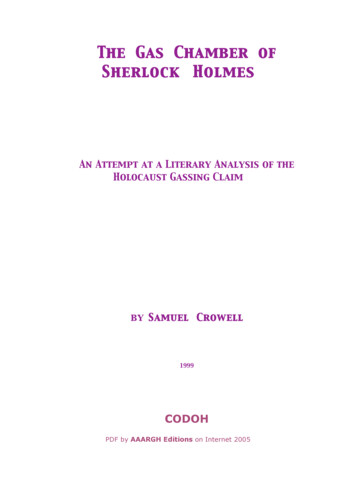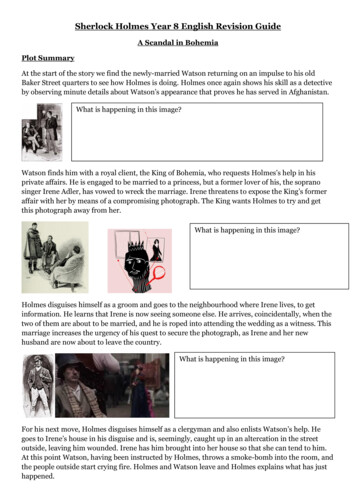
Transcription
Work reproduced with no editorial responsibilityThe Adventures ofSherlock HolmesArthur Conan Doyle
Notice by Luarna EdicionesThis book is in the public domain becausethe copyrights have expired under Spanish law.Luarna presents it here as a gift to its customers, while clarifying the following:1) Because this edition has not been supervised by our editorial deparment, wedisclaim responsibility for the fidelity ofits content.2) Luarna has only adapted the work tomake it easily viewable on common sixinch readers.3) To all effects, this book must not be considered to have been published byLuarna.www.luarna.com
ADVENTURE I. A SCANDAL IN BOHEMIAI.To Sherlock Holmes she is always the woman. Ihave seldom heard him mention her under anyother name. In his eyes she eclipses and predominates the whole of her sex. It was not thathe felt any emotion akin to love for Irene Adler.All emotions, and that one particularly, wereabhorrent to his cold, precise but admirablybalanced mind. He was, I take it, the most perfect reasoning and observing machine that theworld has seen, but as a lover he would haveplaced himself in a false position. He neverspoke of the softer passions, save with a gibeand a sneer. They were admirable things for theobserver—excellent for drawing the veil frommen’s motives and actions. But for the trainedreasoner to admit such intrusions into his own
delicate and finely adjusted temperament wasto introduce a distracting factor which mightthrow a doubt upon all his mental results. Gritin a sensitive instrument, or a crack in one ofhis own high-power lenses, would not be moredisturbing than a strong emotion in a naturesuch as his. And yet there was but one womanto him, and that woman was the late IreneAdler, of dubious and questionable memory.I had seen little of Holmes lately. My marriagehad drifted us away from each other. My owncomplete happiness, and the home-centred interests which rise up around the man who firstfinds himself master of his own establishment,were sufficient to absorb all my attention, whileHolmes, who loathed every form of societywith his whole Bohemian soul, remained in ourlodgings in Baker Street, buried among his oldbooks, and alternating from week to week between cocaine and ambition, the drowsiness ofthe drug, and the fierce energy of his own keen
nature. He was still, as ever, deeply attractedby the study of crime, and occupied his immense faculties and extraordinary powers ofobservation in following out those clues, andclearing up those mysteries which had beenabandoned as hopeless by the official police.From time to time I heard some vague accountof his doings: of his summons to Odessa in thecase of the Trepoff murder, of his clearing up ofthe singular tragedy of the Atkinson brothers atTrincomalee, and finally of the mission whichhe had accomplished so delicately and successfully for the reigning family of Holland. Beyond these signs of his activity, however,which I merely shared with all the readers ofthe daily press, I knew little of my formerfriend and companion.One night—it was on the twentieth of March,1888—I was returning from a journey to a patient (for I had now returned to civil practice),when my way led me through Baker Street. As
I passed the well-remembered door, whichmust always be associated in my mind with mywooing, and with the dark incidents of the Study in Scarlet, I was seized with a keen desire tosee Holmes again, and to know how he wasemploying his extraordinary powers. Hisrooms were brilliantly lit, and, even as I lookedup, I saw his tall, spare figure pass twice in adark silhouette against the blind. He was pacing the room swiftly, eagerly, with his headsunk upon his chest and his hands clasped behind him. To me, who knew his every moodand habit, his attitude and manner told theirown story. He was at work again. He had risenout of his drug-created dreams and was hotupon the scent of some new problem. I rang thebell and was shown up to the chamber whichhad formerly been in part my own.His manner was not effusive. It seldom was;but he was glad, I think, to see me. With hardlya word spoken, but with a kindly eye, he
waved me to an armchair, threw across his caseof cigars, and indicated a spirit case and agasogene in the corner. Then he stood beforethe fire and looked me over in his singular introspective fashion.“Wedlock suits you,” he remarked. “I think,Watson, that you have put on seven and a halfpounds since I saw you.”“Seven!” I answered.“Indeed, I should have thought a little more.Just a trifle more, I fancy, Watson. And in practice again, I observe. You did not tell me thatyou intended to go into harness.”“Then, how do you know?”“I see it, I deduce it. How do I know that youhave been getting yourself very wet lately, andthat you have a most clumsy and careless servant girl?”
“My dear Holmes,” said I, “this is too much.You would certainly have been burned, hadyou lived a few centuries ago. It is true that Ihad a country walk on Thursday and camehome in a dreadful mess, but as I have changedmy clothes I can’t imagine how you deduce it.As to Mary Jane, she is incorrigible, and mywife has given her notice, but there, again, I failto see how you work it out.”He chuckled to himself and rubbed his long,nervous hands together.“It is simplicity itself,” said he; “my eyes tell methat on the inside of your left shoe, just wherethe firelight strikes it, the leather is scored bysix almost parallel cuts. Obviously they havebeen caused by someone who has very carelessly scraped round the edges of the sole inorder to remove crusted mud from it. Hence,you see, my double deduction that you hadbeen out in vile weather, and that you had aparticularly malignant boot-slitting specimen of
the London slavey. As to your practice, if a gentleman walks into my rooms smelling of iodoform, with a black mark of nitrate of silverupon his right forefinger, and a bulge on theright side of his top-hat to show where he hassecreted his stethoscope, I must be dull, indeed,if I do not pronounce him to be an active member of the medical profession.”I could not help laughing at the ease withwhich he explained his process of deduction.“When I hear you give your reasons,” I remarked, “the thing always appears to me to beso ridiculously simple that I could easily do itmyself, though at each successive instance ofyour reasoning I am baffled until you explainyour process. And yet I believe that my eyesare as good as yours.”“Quite so,” he answered, lighting a cigarette,and throwing himself down into an armchair.“You see, but you do not observe. The distinction is clear. For example, you have frequently
seen the steps which lead up from the hall tothis room.”“Frequently.”“How often?”“Well, some hundreds of times.”“Then how many are there?”“How many? I don’t know.”“Quite so! You have not observed. And yet youhave seen. That is just my point. Now, I knowthat there are seventeen steps, because I haveboth seen and observed. By the way, since youare interested in these little problems, and sinceyou are good enough to chronicle one or two ofmy trifling experiences, you may be interestedin this.” He threw over a sheet of thick, pinktinted notepaper which had been lying openupon the table. “It came by the last post,” saidhe. “Read it aloud.”
The note was undated, and without either signature or address.“There will call upon you to-night, at a quarterto eight o’clock,” it said, “a gentleman whodesires to consult you upon a matter of the verydeepest moment. Your recent services to one ofthe royal houses of Europe have shown thatyou are one who may safely be trusted withmatters which are of an importance which canhardly be exaggerated. This account of you wehave from all quarters received. Be in yourchamber then at that hour, and do not take itamiss if your visitor wear a mask.”“This is indeed a mystery,” I remarked. “Whatdo you imagine that it means?”“I have no data yet. It is a capital mistake totheorise before one has data. Insensibly onebegins to twist facts to suit theories, instead oftheories to suit facts. But the note itself. Whatdo you deduce from it?”
I carefully examined the writing, and the paperupon which it was written.“The man who wrote it was presumably well todo,” I remarked, endeavouring to imitate mycompanion’s processes. “Such paper could notbe bought under half a crown a packet. It ispeculiarly strong and stiff.”“Peculiar—that is the very word,” said Holmes.“It is not an English paper at all. Hold it up tothe light.”I did so, and saw a large “E” with a small “g,” a“P,” and a large “G” with a small “t” woveninto the texture of the paper.“What do you make of that?” asked Holmes.“The name of the maker, no doubt; or his monogram, rather.”“Not at all. The ‘G’ with the small ‘t’ stands for‘Gesellschaft,’ which is the German for ‘Com-
pany.’ It is a customary contraction like our‘Co.’ ‘P,’ of course, stands for ‘Papier.’ Now forthe ‘Eg.’ Let us glance at our Continental Gazetteer.” He took down a heavy brown volumefrom his shelves. “Eglow, Eglonitz—here weare, Egria. It is in a German-speaking country—in Bohemia, not far from Carlsbad. ‘Remarkableas being the scene of the death of Wallenstein,and for its numerous glass-factories and papermills.’ Ha, ha, my boy, what do you make ofthat?” His eyes sparkled, and he sent up a greatblue triumphant cloud from his cigarette.“The paper was made in Bohemia,” I said.“Precisely. And the man who wrote the note isa German. Do you note the peculiar construction of the sentence—‘This account of you wehave from all quarters received.’ A Frenchmanor Russian could not have written that. It is theGerman who is so uncourteous to his verbs. Itonly remains, therefore, to discover what iswanted by this German who writes upon Bo-
hemian paper and prefers wearing a mask toshowing his face. And here he comes, if I amnot mistaken, to resolve all our doubts.”As he spoke there was the sharp sound of horses’ hoofs and grating wheels against the curb,followed by a sharp pull at the bell. Holmeswhistled.“A pair, by the sound,” said he. “Yes,” he continued, glancing out of the window. “A nicelittle brougham and a pair of beauties. A hundred and fifty guineas apiece. There’s money inthis case, Watson, if there is nothing else.”“I think that I had better go, Holmes.”“Not a bit, Doctor. Stay where you are. I amlost without my Boswell. And this promises tobe interesting. It would be a pity to miss it.”“But your client—”
“Never mind him. I may want your help, andso may he. Here he comes. Sit down in thatarmchair, Doctor, and give us your best attention.”A slow and heavy step, which had been heardupon the stairs and in the passage, paused immediately outside the door. Then there was aloud and authoritative tap.“Come in!” said Holmes.A man entered who could hardly have beenless than six feet six inches in height, with thechest and limbs of a Hercules. His dress wasrich with a richness which would, in England,be looked upon as akin to bad taste. Heavybands of astrakhan were slashed across thesleeves and fronts of his double-breasted coat,while the deep blue cloak which was thrownover his shoulders was lined with flamecoloured silk and secured at the neck with abrooch which consisted of a single flaming
beryl. Boots which extended halfway up hiscalves, and which were trimmed at the topswith rich brown fur, completed the impressionof barbaric opulence which was suggested byhis whole appearance. He carried a broadbrimmed hat in his hand, while he wore acrossthe upper part of his face, extending down pastthe cheekbones, a black vizard mask, which hehad apparently adjusted that very moment, forhis hand was still raised to it as he entered.From the lower part of the face he appeared tobe a man of strong character, with a thick,hanging lip, and a long, straight chin suggestive of resolution pushed to the length of obstinacy.“You had my note?” he asked with a deepharsh voice and a strongly marked Germanaccent. “I told you that I would call.” He lookedfrom one to the other of us, as if uncertainwhich to address.
“Pray take a seat,” said Holmes. “This is myfriend and colleague, Dr. Watson, who is occasionally good enough to help me in my cases.Whom have I the honour to address?”“You may address me as the Count VonKramm, a Bohemian nobleman. I understandthat this gentleman, your friend, is a man ofhonour and discretion, whom I may trust witha matter of the most extreme importance. If not,I should much prefer to communicate with youalone.”I rose to go, but Holmes caught me by the wristand pushed me back into my chair. “It is both,or none,” said he. “You may say before thisgentleman anything which you may say tome.”The Count shrugged his broad shoulders.“Then I must begin,” said he, “by binding youboth to absolute secrecy for two years; at theend of that time the matter will be of no impor-
tance. At present it is not too much to say that itis of such weight it may have an influence uponEuropean history.”“I promise,” said Holmes.“And I.”“You will excuse this mask,” continued ourstrange visitor. “The august person who employs me wishes his agent to be unknown toyou, and I may confess at once that the title bywhich I have just called myself is not exactlymy own.”“I was aware of it,” said Holmes dryly.“The circumstances are of great delicacy, andevery precaution has to be taken to quenchwhat might grow to be an immense scandaland seriously compromise one of the reigningfamilies of Europe. To speak plainly, the matter
implicates the great House of Ormstein, hereditary kings of Bohemia.”“I was also aware of that,” murmured Holmes,settling himself down in his armchair and closing his eyes.Our visitor glanced with some apparent surprise at the languid, lounging figure of the manwho had been no doubt depicted to him as themost incisive reasoner and most energeticagent in Europe. Holmes slowly reopened hiseyes and looked impatiently at his gigantic client.“If your Majesty would condescend to stateyour case,” he remarked, “I should be betterable to advise you.”The man sprang from his chair and paced upand down the room in uncontrollable agitation.Then, with a gesture of desperation, he tore themask from his face and hurled it upon the
ground. “You are right,” he cried; “I am theKing. Why should I attempt to conceal it?”“Why, indeed?” murmured Holmes. “YourMajesty had not spoken before I was aware thatI was addressing Wilhelm Gottsreich Sigismond von Ormstein, Grand Duke of CasselFelstein, and hereditary King of Bohemia.”“But you can understand,” said our strangevisitor, sitting down once more and passing hishand over his high white forehead, “you canunderstand that I am not accustomed to doingsuch business in my own person. Yet the matterwas so delicate that I could not confide it to anagent without putting myself in his power. Ihave come incognito from Prague for the purpose of consulting you.”“Then, pray consult,” said Holmes, shutting hiseyes once more.
“The facts are briefly these: Some five yearsago, during a lengthy visit to Warsaw, I madethe acquaintance of the well-known adventuress, Irene Adler. The name is no doubt familiarto you.”“Kindly look her up in my index, Doctor,”murmured Holmes without opening his eyes.For many years he had adopted a system ofdocketing all paragraphs concerning men andthings, so that it was difficult to name a subjector a person on which he could not at once furnish information. In this case I found her biography sandwiched in between that of a Hebrewrabbi and that of a staff-commander who hadwritten a monograph upon the deep-sea fishes.“Let me see!” said Holmes. “Hum! Born inNew Jersey in the year 1858. Contralto—hum!La Scala, hum! Prima donna Imperial Opera ofWarsaw—yes! Retired from operatic stage—ha!Living in London—quite so! Your Majesty, as Iunderstand, became entangled with this young
person, wrote her some compromising letters,and is now desirous of getting those lettersback.”“Precisely so. But how—”“Was there a secret marriage?”“None.”“No legal papers or certificates?”“None.”“Then I fail to follow your Majesty. If thisyoung person should produce her letters forblackmailing or other purposes, how is she toprove their authenticity?”“There is the writing.”“Pooh, pooh! Forgery.”“My private note-paper.”
“Stolen.”“My own seal.”“Imitated.”“My photograph.”“Bought.”“We were both in the photograph.”“Oh, dear! That is very bad! Your Majesty hasindeed committed an indiscretion.”“I was mad—insane.”“You have compromised yourself seriously.”“I was only Crown Prince then. I was young. Iam but thirty now.”“It must be recovered.”“We have tried and failed.”
“Your Majesty must pay. It must be bought.”“She will not sell.”“Stolen, then.”“Five attempts have been made. Twice burglarsin my pay ransacked her house. Once we diverted her luggage when she travelled. Twiceshe has been waylaid. There has been no result.”“No sign of it?”“Absolutely none.”Holmes laughed. “It is quite a pretty little problem,” said he.“But a very serious one to me,” returned theKing reproachfully.“Very, indeed. And what does she propose todo with the photograph?”
“To ruin me.”“But how?”“I am about to be married.”“So I have heard.”“To Clotilde Lothman von Saxe-Meningen,second daughter of the King of Scandinavia.You may know the strict principles of her family. She is herself the very soul of delicacy. Ashadow of a doubt as to my conduct wouldbring the matter to an end.”“And Irene Adler?”“Threatens to send them the photograph. Andshe will do it. I know that she will do it. You donot know her, but she has a soul of steel. Shehas the face of the most beautiful of women,and the mind of the most resolute of men. Rather than I should marry another woman, there
are no lengths to which she would not go—none.”“You are sure that she has not sent it yet?”“I am sure.”“And why?”“Because she has said that she would send it onthe day when the betrothal was publicly proclaimed. That will be next Monday.”“Oh, then we have three days yet,” saidHolmes with a yawn. “That is very fortunate,as I have one or two matters of importance tolook into just at present. Your Majesty will, ofcourse, stay in London for the present?”“Certainly. You will find me at the Langhamunder the name of the Count Von Kramm.”“Then I shall drop you a line to let you knowhow we progress.”
“Pray do so. I shall be all anxiety.”“Then, as to money?”“You have carte blanche.”“Absolutely?”“I tell you that I would give one of the provinces of my kingdom to have that photograph.”“And for present expenses?”The King took a heavy chamois leather bagfrom under his cloak and laid it on the table.“There are three hundred pounds in gold andseven hundred in notes,” he said.Holmes scribbled a receipt upon a sheet of hisnote-book and handed it to him.“And Mademoiselle’s address?” he asked.
“Is Briony Lodge, Serpentine Avenue, St. John’sWood.”Holmes took a note of it. “One other question,”said he. “Was the photograph a cabinet?”“It was.”“Then, good-night, your Majesty, and I trustthat we shall soon have some good news foryou. And good-night, Watson,” he added, asthe wheels of the royal brougham rolled downthe street. “If you will be good enough to callto-morrow afternoon at three o’clock I shouldlike to chat this little matter over with you.”II.At three o’clock precisely I was at Baker Street,but Holmes had not yet returned. The landladyinformed me that he had left the house shortlyafter eight o’clock in the morning. I sat downbeside the fire, however, with the intention of
awaiting him, however long he might be. I wasalready deeply interested in his inquiry, for,though it was surrounded by none of the grimand strange features which were associatedwith the two crimes which I have already recorded, still, the nature of the case and the exalted station of his client gave it a character ofits own. Indeed, apart from the nature of theinvestigation which my friend had on hand,there was something in his masterly grasp of asituation, and his keen, incisive reasoning,which made it a pleasure to me to study hissystem of work, and to follow the quick, subtlemethods by which he disentangled the mostinextricable mysteries. So accustomed was I tohis invariable success that the very possibilityof his failing had ceased to enter into my head.It was close upon four before the door opened,and a drunken-looking groom, ill-kempt andside-whiskered, with an inflamed face and disreputable clothes, walked into the room. Accus-
tomed as I was to my friend’s amazing powersin the use of disguises, I had to look three timesbefore I was certain that it was indeed he. Witha nod he vanished into the bedroom, whencehe emerged in five minutes tweed-suited andrespectable, as of old. Putting his hands into hispockets, he stretched out his legs in front of thefire and laughed heartily for some minutes.“Well, really!” he cried, and then he chokedand laughed again until he was obliged to lieback, limp and helpless, in the chair.“What is it?”“It’s quite too funny. I am sure you could neverguess how I employed my morning, or what Iended by doing.”“I can’t imagine. I suppose that you have beenwatching the habits, and perhaps the house, ofMiss Irene Adler.”
“Quite so; but the sequel was rather unusual. Iwill tell you, however. I left the house a littleafter eight o’clock this morning in the characterof a groom out of work. There is a wonderfulsympathy and freemasonry among horsey men.Be one of them, and you will know all thatthere is to know. I soon found Briony Lodge. Itis a bijou villa, with a garden at the back, butbuilt out in front right up to the road, two stories. Chubb lock to the door. Large sitting-roomon the right side, well furnished, with longwindows almost to the floor, and those preposterous English window fasteners which a childcould open. Behind there was nothing remarkable, save that the passage window could bereached from the top of the coach-house. Iwalked round it and examined it closely fromevery point of view, but without noting anything else of interest.“I then lounged down the street and found, as Iexpected, that there was a mews in a lane
which runs down by one wall of the garden. Ilent the ostlers a hand in rubbing down theirhorses, and received in exchange twopence, aglass of half-and-half, two fills of shag tobacco,and as much information as I could desireabout Miss Adler, to say nothing of half adozen other people in the neighbourhood inwhom I was not in the least interested, butwhose biographies I was compelled to listento.”“And what of Irene Adler?” I asked.“Oh, she has turned all the men’s heads downin that part. She is the daintiest thing under abonnet on this planet. So say the Serpentinemews, to a man. She lives quietly, sings at concerts, drives out at five every day, and returnsat seven sharp for dinner. Seldom goes out atother times, except when she sings. Has onlyone male visitor, but a good deal of him. He isdark, handsome, and dashing, never calls lessthan once a day, and often twice. He is a Mr.
Godfrey Norton, of the Inner Temple. See theadvantages of a cabman as a confidant. Theyhad driven him home a dozen times from Serpentine-mews, and knew all about him. When Ihad listened to all they had to tell, I began towalk up and down near Briony Lodge oncemore, and to think over my plan of campaign.“This Godfrey Norton was evidently an important factor in the matter. He was a lawyer. Thatsounded ominous. What was the relation between them, and what the object of his repeatedvisits? Was she his client, his friend, or his mistress? If the former, she had probably transferred the photograph to his keeping. If thelatter, it was less likely. On the issue of thisquestion depended whether I should continuemy work at Briony Lodge, or turn my attentionto the gentleman’s chambers in the Temple. Itwas a delicate point, and it widened the field ofmy inquiry. I fear that I bore you with these
details, but I have to let you see my little difficulties, if you are to understand the situation.”“I am following you closely,” I answered.“I was still balancing the matter in my mindwhen a hansom cab drove up to Briony Lodge,and a gentleman sprang out. He was a remarkably handsome man, dark, aquiline, andmoustached—evidently the man of whom I hadheard. He appeared to be in a great hurry,shouted to the cabman to wait, and brushedpast the maid who opened the door with the airof a man who was thoroughly at home.“He was in the house about half an hour, and Icould catch glimpses of him in the windows ofthe sitting-room, pacing up and down, talkingexcitedly, and waving his arms. Of her I couldsee nothing. Presently he emerged, lookingeven more flurried than before. As he steppedup to the cab, he pulled a gold watch from hispocket and looked at it earnestly, ‘Drive like the
devil,’ he shouted, ‘first to Gross & Hankey’s inRegent Street, and then to the Church of St.Monica in the Edgeware Road. Half a guinea ifyou do it in twenty minutes!’“Away they went, and I was just wonderingwhether I should not do well to follow themwhen up the lane came a neat little landau, thecoachman with his coat only half-buttoned, andhis tie under his ear, while all the tags of hisharness were sticking out of the buckles. Ithadn’t pulled up before she shot out of the halldoor and into it. I only caught a glimpse of herat the moment, but she was a lovely woman,with a face that a man might die for.“ ‘The Church of St. Monica, John,’ she cried,‘and half a sovereign if you reach it in twentyminutes.’“This was quite too good to lose, Watson. I wasjust balancing whether I should run for it, orwhether I should perch behind her landau
when a cab came through the street. The driverlooked twice at such a shabby fare, but Ijumped in before he could object. ‘The Churchof St. Monica,’ said I, ‘and half a sovereign ifyou reach it in twenty minutes.’ It was twentyfive minutes to twelve, and of course it wasclear enough what was in the wind.“My cabby drove fast. I don’t think I ever drovefaster, but the others were there before us. Thecab and the landau with their steaming horseswere in front of the door when I arrived. I paidthe man and hurried into the church. There wasnot a soul there save the two whom I had followed and a surpliced clergyman, who seemedto be expostulating with them. They were allthree standing in a knot in front of the altar. Ilounged up the side aisle like any other idlerwho has dropped into a church. Suddenly, tomy surprise, the three at the altar faced roundto me, and Godfrey Norton came running ashard as he could towards me.
“ ‘Thank God,’ he cried. ‘You’ll do. Come!Come!’“ ‘What then?’ I asked.“ ‘Come, man, come, only three minutes, or itwon’t be legal.’“I was half-dragged up to the altar, and before Iknew where I was I found myself mumblingresponses which were whispered in my ear,and vouching for things of which I knew nothing, and generally assisting in the secure tyingup of Irene Adler, spinster, to Godfrey Norton,bachelor. It was all done in an instant, andthere was the gentleman thanking me on theone side and the lady on the other, while theclergyman beamed on me in front. It was themost preposterous position in which I everfound myself in my life, and it was the thoughtof it that started me laughing just now. It seemsthat there had been some informality abouttheir license, that the clergyman absolutely re-
fused to marry them without a witness of somesort, and that my lucky appearance saved thebridegroom from having to sally out into thestreets in search of a best man. The bride gaveme a sovereign, and I mean to wear it on mywatch chain in memory of the occasion.”“This is a very unexpected turn of affairs,” saidI; “and what then?”“Well, I found my plans very seriously menaced. It looked as if the pair might take an immediate departure, and so necessitate veryprompt and energetic measures on my part. Atthe church door, however, they separated, hedriving back to the Temple, and she to her ownhouse. ‘I shall drive out in the park at five asusual,’ she said as she left him. I heard nomore. They drove away in different directions,and I went off to make my own arrangements.”“Which are?”
“Some cold beef and a glass of beer,” he answered, ringing the bell. “I have been too busyto think of food, and I am likely to be busierstill this evening. By the way, Doctor, I shallwant your co-operation.”“I shall be delighted.”“You don’t mind breaking the law?”“Not in the least.”“Nor running a chance of arrest?”“Not in a good cause.”“Oh, the cause is excellent!”“Then I am your man.”“I was sure that I might rely on you.”“But what is it you wish?”
“When Mrs. Turner has brought in the tray Iwill make it clear to you. Now,” he said as heturned hungrily on the simple fare that ourlandlady had provided, “I must discuss it whileI eat, for I have not much time. It is nearly fivenow. In two hours we must be on the scene ofaction. Miss Irene, or Madame, rather, returnsfrom her drive at seven. We must be at BrionyLodge to meet her.”“And what then?”“You must leave that to me. I have already arranged what is to occur. There is only one pointon which I must insist. You must not interfere,come what may. You understand?”“I am to be neutral?”“To do nothing whatever. There will probablybe some small unpleasantness. Do not join in it.It will end in my being conveyed into thehouse. Four or five minutes afterwards the sit-
ting-room window will open. You are to stationyourself close to that open window.”“Yes.”“You are to watch me, for I will be visible toyou.”“Yes.”“And when I raise my hand—so—you willthrow into the room what I give you to throw,and will, at the same time, raise the cry of fire.You quite follow me?”“Entirely.”“It is nothing very formidable,” he said, takinga long cigar-shaped roll from his pocket. “It isan ordinary plumber’s smoke-rocket, fittedwith a cap a
Sherlock Holmes Work reproduced with no editorial responsibil Arthur Conan Doyle ity. Notice by Luarna Ediciones This book is in the public domain because the copyrights have expired under Spanish law. Luarna presents it here as
